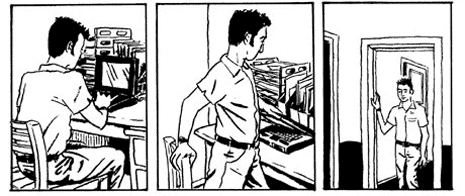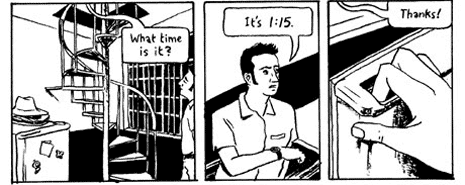Matt Madden has been exploring the limits and variations of the comics medium for years now, shown perhaps best in his Exercises in Style.
You seem fascinated by experimentation within constraints. (And indeed, teach a course in it.) What are the constraints you see for webcomics, as opposed to other graphical media? What inspirations can we draw from them?
I don’t really consider myself a "web cartoonist" per se, so I haven’t thought about it a lot, but a lot of what Scott McCloud talks about–and puts into practice in his work–is interesting to me in terms of adapting the form and content of comics to the Internet, html, Flash, etc. Scott’s recent work and that of a few other cartoonists out there exploits the possibility of having an endless "page" that the reader can navigate in an unusually interactive way. There are also lots of possibilities for using "hypertext" style ideas to create expanding stories that exist in multiple planes (e.g. you click on a panel and it opens a whole new strip in a new window which tells a related story). On the other hand, some of these technologies can be pretty gimmicky. I don’t find it terribly interesting or experimental to have a regular old comic strip where a dog’s tail is wagging or the sun is flashing little animated sun rays.

You derived the idea of Exercises in Style from the original prose exercise, and the graphical version Oubapo, in French, and spent some of your formative years in France. Who do you think are the foremost current French comic artists (both in print comics and webcomics) currrently that English writers could learn the most from?
Fortunately, more and more French artists are appearing in English, so let me name my favorite artists who are available in English:
Joann Sfar (probably my single favorite French artist right now–look for The Rabbi’s Cat from Pantheon this year)
David B (Epileptic, Babel)
Edmond Baudoin (I translated a story of his for Rosetta 2)
Lewis Trondheim
Blutch (see Drawn and Quarterly for some short stories of his)
Dupuy-Berberian (The writing team of the Monsieur Jean stories appearing in D&Q)
Marc-Antoine Mathieu (Dark Horse did his Dead Memory, not his best but hopefully there’s more to come)
Blutch and Baudoin are worth checking out for their virtuosic, rough-hewn drawing styles which are heavily influencing some of our younger cartoonists, like Craig Thompson for one. D-B present a kind of successful pop narrative that is more akin to well-made cable TV shows than to anything going on in US comics. And I believe David B’s Epileptic is an amazing work, possibly the best and most important comic to come out since Maus.
I know from your writing for The Comics Journal something about who you admire now. Can you tell us whose work you are interested in right now and also who or what got you hooked on comics as a youth?
I actually wasn’t a huge comics fan as a kid. I read a fair amount of Tintin and Asterix and a smattering of Marvel superhero stuff. I didn’t get sucked in until my teens when I discovered Heavy Metal (in the era when they ran Moebius, Bilal, Pratt, etc), Zap, and Raw all within a few years of each other.
In no particular order, here is a random sampling of some of the artists I am currently/perennially excited about (not including the French authors listed elsewhere): Gary Panter, Daniel Clowes, Ben Katchor, Kevin Huizenga, George Herriman, Charles Burns, Tom Hart, Nick Bertozzi, Lauren Weinstein, Gabrielle Bell, Lat, Joe Sacco, Fabio Zimbres, Lorenzo Mattotti, Francesca Ghermandi…
I could go on… I like a lot of manga but I’m not an expert. I like off beat stuff like Garo/Ax artists and also more pop SF opera stuff like Otomo and Miyazake.

You’ve done both. Which do you prefer, the longer graphic novel style or the short brief story or minicomic?
I don’t have a preference. Both have their strengths and weaknesses, their joys and frustrations. I hope to keep alternating between both forms throughout my life. That also goes for doing photocopied minicomics in addition to working with major publishers.
Is it difficult being married to a highly creative person like Jessica Abel? How’s the graphic novel "how to" book you’re writing together progressing?
It’s great, we feed off of each other’s energy and since we do the same thing we never have any schedule conflicts when comics conventions come around. We are very different artists, but we learn a lot from each other and keep each other in perspective creatively, professionally, and personally.
We do have a book deal to do a textbook–not just for graphic novels but for comics in general–that will be partly based on the teaching we have been doing for the last four years. We won’t really start working on it until this spring and it’s going to take us two years to deliver it so don’t hold your breath!
Many of your stories are set in college or post-collegiate or other parts of academic life. Why are you drawn to that again and again?
They say write what you know and I lived in college towns for ten years so that was the world I drew from for a lot of my earlier work. One aspect of my work–which I have strayed from in the last few years–is an interest in the mundane and the everyday. Part of me wants to reject fantasy and idealization and concentrate on what is right in front of me for my inspiration. Lately I have been enjoying indulging in more patently imaginary worlds (as in my story The Six Treasures of the Spiral), but the everyday is something I always come back to. I am no longer a student but now I am a teacher so the college campus has almost certainly not made its last appearance in my work!
Additionally, I enjoy a certain number of writers –Nabokov in particular–who use the college town and academic life as a recurring backdrop to their work, so I imagine that influences me as well.
Are there any webcomics besides your own that you think should be better known than they are? (I’d be especially interested in what non-English ones you think need more exposure.)
Again, although "Exercises in Style" appears on the Internet, I do not consider it a "web comic" because it very much falls under the category of appearing there only to generate interest in the eventual book collection (which, incidentally, is due out this fall from Penguin Books).
What do you think is a webcomic?
To me a web comic is a comic that is more or less intended to appear primarily on the Internet, so that the art is designed to look good at low resolution and the stories are usually serialized short strips which might or might not have continuity. I only make the distinction about Exercises in Style NOT being a web comic, strictly speaking, because I have always intended for it to appear in book form, so for example a lot of the art is too detailed or fine to be legible at low resolution.

What work of your own has given you the most joy?
Although right now it is pushing me to utter exhaustion, Exercises in Style has definitely been the most rewarding and enlightening project I have undertaken. I am worn out by my deadline, but I am far from tired with the concept of the project, and each new exercise brings new challenges and surprises. I’ve been working on it so long, too (I started in 1998), that I have a certain distance from it and can enjoy reading through the earlier pages.
What work has been the most frustrating or difficult?
That’s a tough question. In terms of sheer banging my head against the drawing table, Prisoner of Zembla, from A Fine Mess #2, is probably the most difficult comic I have done, considering it is only three pages long. That took a lot of sketching and editing and reworking until I finally got it right. For better or worse, comics only get more difficult and frustrating for me as I mature as an artist. On the one hand I am doing very ambitious stories with a lot of levels –form, drawing, story, concept– that I need to manage, and on the other hand that old cliche really is true about how the more you learn the more you realize how little you know. There’s really no end to the kinds of challenges –both technical and creative– that comics present. What is gratifying is that sometimes that difficulty and frustration can lead to a very rewarding (if often fleeting) sense of accomplishment.
Al Schroeder is an Executive Editor for Comixpedia. He also creates the webcomic, Mind Mistress.
Recent Comments